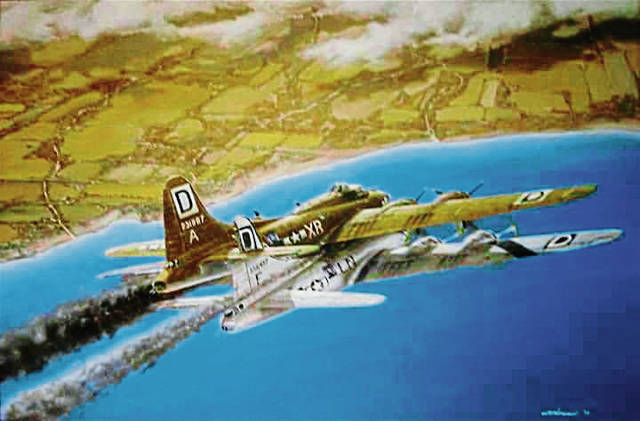https://triblive.com/local/westmoreland/piggback-flight-of-world-war-ii-bombers-recalled/
‘Piggyback’ flight of World War II bombers recalled

After what he endured on Dec. 31, 1944, while under heavy attack during an ill-fated bombing mission over northern Germany, Glenn H. Rojohn had no interest in popping a bottle of champagne and ringing in the new year.
“We never celebrated New Year’s Eve,” said his son, David Rojohn of Jefferson.
New Year’s Day would not bring about much better memories because on the first day of 1945, Glenn Rojohn was a new prisoner of war. He would remain a German prisoner until the war’s end, five months later.
Rojohn, who grew up on a farm in Greenock, Elizabeth Township, was piloting a B-17 Flying Fortress in the New Year’s Eve attack on a synthetic oil factory in Hamburg when all hell broke loose. Besieged by heavy anti-aircraft flak near the target and wave after wave of strafing by German Messerschmitt fighters, 12 of 37 planes were downed and 100 crewmen were killed, captured or missing, according to David Rojohn and his sister, Cyndi Rojohn of Elizabeth Township.
Rojohn survived what became one of the miracles of the war when his B-17 collided in mid-air with a bomber below it and became hooked together in what has become known as the “piggyback flight.” A propeller and top guns of the lower B-17 were jammed into Rojohn’s B-17 and he and his co-pilot, William Leek, were unable to free their plane, Cyndi Rojohn said.
Somehow, Rojohn and his co-pilot landed the conjoined planes on German soil near Wilhemshaven. Rojohn’s plane slid free upon impact, and the lower plane exploded and burned, Cyndi Rojohn said.
As for telling his family about the experience, it was “nothing for a long, long, long time,” and it was not until he attended reunions of his wartime comrades that he discussed it, David Rojohn said.
Rojohn, who went into the Army in October 1942 with the intention of being a bomber pilot, would undergo two weeks of interrogation by the Germans. They thought Rojohn was piloting a new eight-engine warplane the Allies had developed rather than it being the accidental joining of two planes in mid-air, David Rojohn said.
“They thought it was a super plane,” David Rojohn said.
The harrowing experience for Rojohn and his crew evolved out of the fog of war — and in this case, literal fog.
Rojohn’s crew, part of the 8th Army Air Force’s 100th Bomb Group, were awakened in the middle of the night and told they were to fly across the English Channel and the North Sea to participate in a massive bombing raid. A fighter escort they were supposed to meet over the English Channel never materialized because of heavy fog, so they were flying the bombing mission against German targets without protection during the Battle of the Bulge.
“They were sitting ducks” for the German fighter planes, David Rojohn said. “They should not have gone on the mission.”
The Rojohns said it is not known why the lower plane collided with their father’s B-17 at about 19,000 feet as their father flew to fill a gap in the “V” formation caused by other planes being shot down. They believe the pilots of the other plane were incapacitated. While the lower plane’s engines kept operating and cut into Rojohn’s B-17, Rojohn and his co-pilot turned off their plane’s engines and turned south toward Germany to try to land the plane.
“Dad always said if they went into the (frigid) water, they were dead,” David Rojohn said.
Unfortunately, some crew bailed out over water, unaware they had not reached land. Three crew members died and the survivors were captured.
At the POW camp, Rojohn and his fellow airmen survived on rutabagas and bread made with sawdust because of the flour shortage, David Rojohn said. It was not until the German guards left that they learned the Germans were hoarding Red Cross packages filled with food that the prisoners should have received.
“He said they treated them in accordance with the Geneva Convention,” David Rojohn said. “That was about as much as you could get out of him.”
For their heroic actions, Rojohn and his co-pilot, William Leek, were awarded the Distinguished Flying Cross. Rojohn was inducted into the Hall of Valor at the Soldiers & Sailors Memorial Hall & Museum in Oakland in 2002. He died in 2003 at age 81.
The story of Rojohn’s flight and the heroics involved in saving as many of the crew as possible is detailed in a book, “The Piggyback Flight Pilot’s Journey,” which Cyndi Rojohn wrote with contributions from her brother. The book, published in December 2018, contains 260 images, including mission logs, witness statements and letters from the POW camp that Glenn Rojohn’s mother saved.
The war changed Glenn Rojohn’s dreams of a career as an airplane pilot. Instead, he remained on land, joining his father in their heating and cooling business.
Copyright ©2025— Trib Total Media, LLC (TribLIVE.com)
